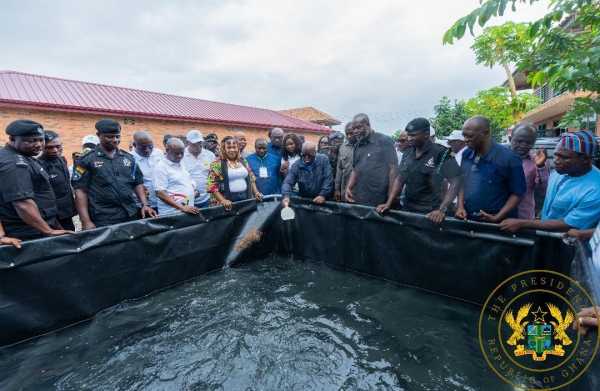“Ghana’s President, Nana Addo Dankwa Akufo-Addo, has introduced the Aquaculture for Food and Jobs Programme, a groundbreaking initiative aimed at harnessing the country’s water resources to enhance food security and create employment opportunities.

This program marks a significant milestone in Ghana’s agricultural sector, with the potential to transform the lives of thousands of people, particularly youth and women.
The initiative seeks to address the country’s fish supply shortage, which currently relies heavily on imports, straining foreign exchange reserves.
In 2022, Ghana’s fish demand stood at 1.31 million metric tonnes, with domestic production only meeting half of this requirement.
By boosting local fish production, the program aims to reduce dependence on imports, conserve foreign exchange, and ensure the availability of fresh, domestically-produced fish.
This will not only improve nutritional standards but also combat malnutrition and enhance public health.
The program’s impact extends beyond increasing fish production, as it will provide training and support to aspiring fish farmers, equip them with necessary skills and resources, and foster a network of fish farms across the country.
President Akufo-Addo emphasized the immense potential of aquaculture, highlighting its critical role in the global food system.
He called on private investors to seize opportunities presented by this program, which has the potential to generate thousands of jobs along the aquaculture value chain.
Research institutions and universities will play a crucial role in providing knowledge and technological innovations to enhance productivity and sustainability.
The government will provide youth with training and skills development in fish farming, enabling them to start profitable businesses within six months.
The launch of the Aquaculture for Food and Jobs Programme signifies a bold step towards a brighter future for Ghanaian youth and women, aiming to meet fish consumption needs, reduce import dependency, and provide meaningful employment.”























































![[FREE FREE MONEY] Predict and Win a Guaranteed GH¢200 From Us EVERY WEEK](https://wordpress.ghanatalksradio.com/wp-content/uploads/2022/02/Predict-and-Win-Final-09-03-2021-218x150.jpg)
![[Predict & Win – 8th/Oct.] WIN A Guaranteed ¢200 From Us This Week](https://wordpress.ghanatalksradio.com/wp-content/uploads/2021/10/maxresdefault-16-218x150.jpg)
![[Predict & Win – 2nd] WIN A Guaranteed ¢200 From Us This Week](https://wordpress.ghanatalksradio.com/wp-content/uploads/2021/09/maxresdefault-50-218x150.jpg)
![[Predict & Win – 25th] WIN A Guaranteed ¢200 From Us This Week](https://wordpress.ghanatalksradio.com/wp-content/uploads/2021/09/maxresdefault-36-218x150.jpg)
![[Predict & Win – 18th] WIN A Guaranteed ¢200 From Us This Week](https://wordpress.ghanatalksradio.com/wp-content/uploads/2021/09/maxresdefault-23-218x150.jpg)








![[National cathedral] See full list of churches that have contributed since 2018](https://wordpress.ghanatalksradio.com/wp-content/uploads/2020/09/Ghana-National-Cathedral-GhanaTalksRadio-100x70.jpg)



